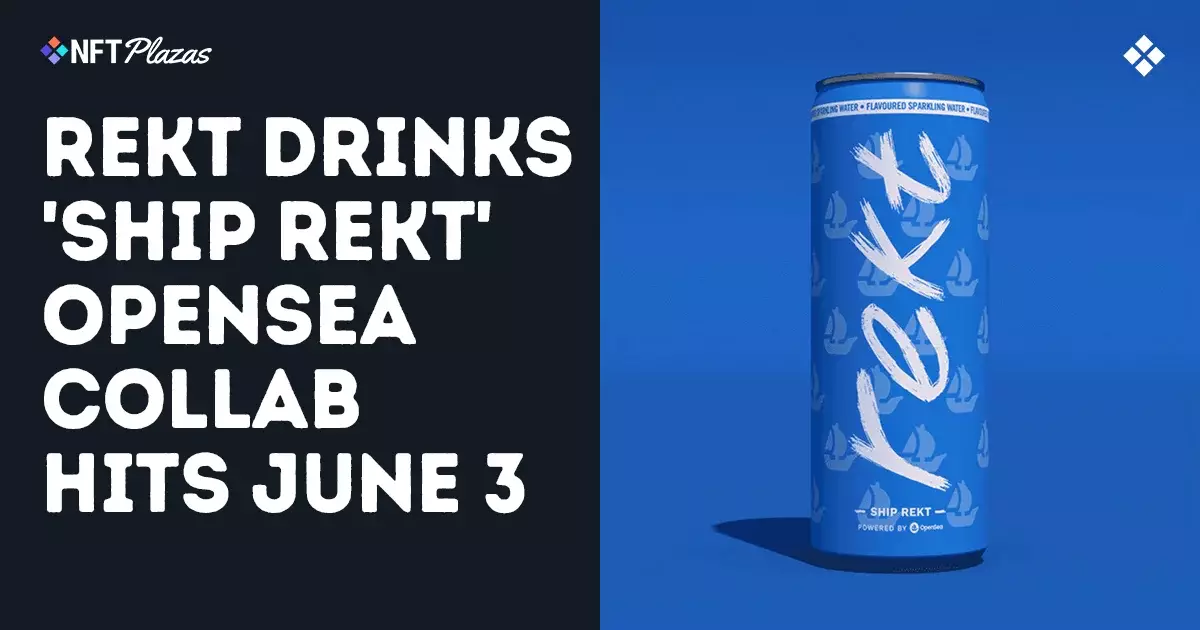The NFT landscape has been characterized by a wave of innovation that transcends traditional boundaries, and the latest collaboration between Rekt Drinks and OpenSea epitomizes this shift. On June 3rd, Rekt Drinks is set to unveil its limited-edition sparkling water flavor, “Ship Rekt,” marking both a fascinating intersection of beverage culture and digital currency. Priced at 0.029 ETH, or approximately $75, this unique offering has the potential to redefine how consumers engage with both trendy drinks and the NFT marketplace. However, this initiative also spotlights a disconcerting trend of commodifying even the most mundane experiences.
The Alchemy of Flavors and Tokens
For the unversed, Rekt Drinks is leveraging the allure of NFTs by fusing it with their sparkling water flavors: Liquidated Lime, Abstract Apple, and now Ship Rekt. This strategic approach, while undeniably clever, has broader implications for our consumption patterns. The introduction of 7,500 NFTs tied to a grapefruit and raspberry beverage is thrilling for early adopters and NFT enthusiasts, yet it raises questions about sustainability within the increasing commercial frenzy surrounding NFTs. Are we witnessing a genuine cultural evolution or merely a cash grab disguised as innovation?
Each NFT purchased allows buyers to redeem a 24-pack of the new flavor. This model promotes a sense of community through “Rekt DRANK points,” but skews toward consumerism that eliminates the simple joy of enjoying a drink. With the NFT mechanism embedded into the purchase, everyday consumers may feel compelled to buy into this digital frenzy, further entrenching the financial speculation that undermines the true value of creative endeavors.
Exclusive Releases and Scarcity
The allure of scarcity is powerful, and the current trend of limited-edition releases exploits this psychological phenomenon. With two concurrent drops aimed at both North American and international buyers, Rekt Drinks has generated excitement. The competition to be the first to sell out is not only a clever marketing tactic but also a dangerous gamble with consumer behavior. Do we desire these unique flavors, or are we merely drawn in by the financial stakes involved in owning an NFT?
The temptation of a “25% DRANK points bonus” for the first region to sell out only serves to exacerbate this paradox, turning what should be a straightforward purchase into a speculative venture. It raises a disturbing question: are we focusing on the product or on the lottery of acquisition? Ultimately, consumer loyalty may shift from flavor preference to speculative endurance.
Market Dynamics and Consumer Traps
Rekt Drinks’ foray into the NFT market indicates a significant shift in beverage and commodity marketing, grabbing attention with an astonishing $65 million market cap for its underlying $REKT token. However, the surprising pivot toward a tokenized consumer loyalty program raises eyebrows regarding the sustainability of such a model. Will everyday consumers remain engaged, or are they merely participants in an ephemeral trend destined for obsolescence?
As the cost of shipping varies across regions, adding layers of complexity to international transactions, it must be noted that the ease of access to these NFTs often conceals the pitfalls lurking beneath the surface. The reality of shipping costs and availability may prove to be a barrier to entry for many, emphasizing the exclusivity of who can join the fun. Meanwhile, those who do partake may inadvertently fuel a volatile market that prioritizes profits over quality.
The Future of NFT-based Brands
The partnership between Rekt Drinks and OpenSea signals what may be a sustainable trend for innovative brands seeking to engage consumers through novel channels. However, it is critical to temper enthusiasm with skepticism. The inherent risks involved in merging traditional beverages with complex financial instruments should be carefully scrutinized. Brands must walk a fine line between creating an enjoyable product and capitalizing on a fleeting moment to generate profit.
As we venture deeper into this brave new world of digital assets, vigilance will be necessary to ensure that the focus remains on quality, sustainability, and genuine consumer engagement rather than the relentless pursuit of exclusivity and profit. In the end, will we be delighted by a unique beverage experience, or will we simply find ourselves lost in the chaotic wave of digital ownership?

